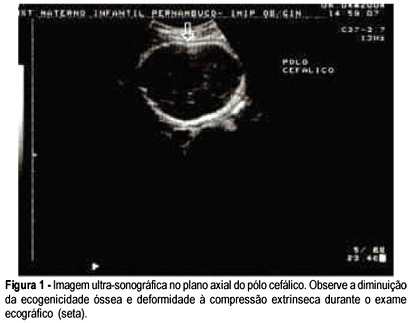Revista Brasileira de Ginecologia e Obstetrícia. 2006;28(4):244-250

Osteogenesis imperfecta is a connective tissue disorder due to quantitative and qualitative anomalies in type 1 collagen, genetically transmitted by a dominant or recessive autosomal gene, leading to bone fragility. We report a case of a 19-year-old G1 PO patient referred to our institution following a screening ultrasound that demonstrated short limb fetal extremities. A level 3 scan was performed which evidenced an irregular cranial shape and compression of the cephalic pole with moderate transducer pressure. Limb shortening, decreased echoes and fractures of long bones were found on our scan evaluation. A vaginal delivery occurred at 35 weeks of gestation. The male newborn, weighing 1.990 grams had 6 and 8 in Apgar scores. The neonate was clearly abnormal, presenting irregular cranial shape, with poor ossification on X-ray, blue sclera, fractures and limb deformities. Postnatal evaluation was satisfactory and the neonate was discharged in good conditions. Prenatal diagnosis is important for an adequate pregnancy follow-up. Postnatal outcome was not related to vaginal delivery, as there were no recent fractures in the newborn.
Search
Search in:


Comments